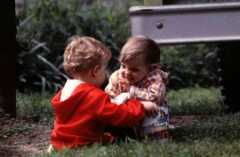

Spiritual Development
As we grow up we tend to experience and express our faith differently. Different things will be important to us. To a certain extent it is possible to generalise about the priorities we will have as we grow up. This is only a generalisation, however. Each child is unique.
John H. Westerhoff suggests that there are four basic styles of believing into which people progress. We do not abandon earlier styles as we grow, but each development is laid down on the base of the old one. We may move backwards and forwards between them as our needs change.
Westerhoff’s styles are;
1. Experienced faith.
The accepting faith of early childhood – responding to sights, sounds etc . but unconcerned about meaning.
“But trailing clouds of glory do we come/From God who is our home;/Heaven lies about us in our infancy! /Shades of the prison house begin to close /Upon the growing Boy.”
Wordsworth.
2. Affiliative faith.
The sense of belonging to a faith community, usually that of the parents, and uncritically assuming the beliefs and practices of that community. This is common in the primary years.
3. Searching faith.
The questioning and critical style in which accepted norms are challenged. This is common among teenagers and young adults – it is not a sign that something has gone wrong, and is vital if adult faith is to develop.
4. Mature faith.
Faith that has been explored and questioned and which is now owned – consciously accepted and acknowledged – with all the commitments to the lifestyle that faith demands.
Questions to think about later
Does Westerhoff's pattern fit with your experience of your own life?
What implications does Westerhoff’s pattern have for the way we nurture children and young people spiritually?
WHAT DO CHILDREN NEED?
John Bradford, in a book produced for the Children’s Society (ISBN 0 907324 97 5), suggests that children (and adults too!) have five basic spiritual needs, which, if met well enough produce fruit in their lives.Churches can help to meet these needs for;
- Love – gives a sense of significance, which produces a capacity for friendship and human interaction.
- Security – both immediate and ultimate, produces an ability to deal with difficulties.
- New creative experiences (wonder) – play, exploration, and space for inner reflection produce a capacity to try things out, to be adventurous and to develop reverence.
- Affirmation – encouragement for positive behaviour and the setting of limits give rise to a sense of direction and confidence to grow and develop.
- Participation and responsibility – involvement in family and neighbourhood gives a sense of being related to the community and the wider world, it produces a sense of social responsibility.
- love – by giving a sense of membership and a religious identity – telling each child that he/she matters.
- security – by providing an established creed and moral code.
- wonder – by giving chances to grow and discover in rich worship experiences and by fostering an inner devotional life.
- affirmation – by showing interest in and pastoral care of one another.
- participation – by providing chances to be involved and serve one another.
Questions to reflect on and discuss later.
Do you feel that your spiritual needs were met when you were a child?
Who met them and how ?
Did the church meet them?
In your church’s worship, how do you meet these needs?
Childrens spirituality websites and other links
The Culham Institute
The Stapleford Centre
The Re Site
Home
Praying with children
Email: Anne